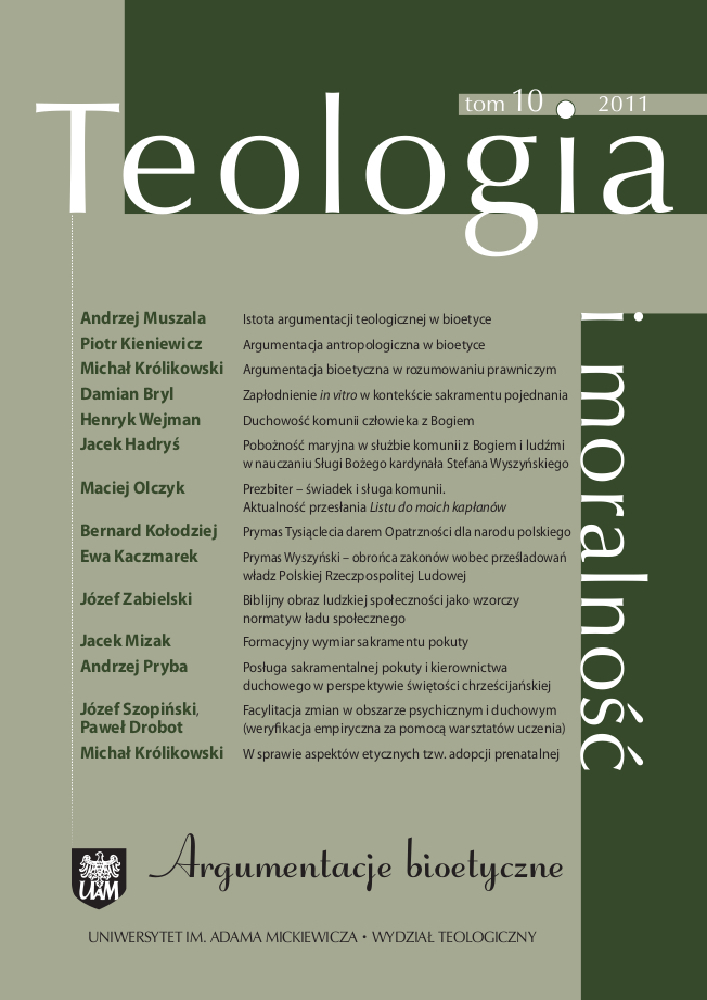Abstract
Today we can often observe various forms of disturbance of social order. However, people seek ways of dealing with this problem. For Christians, Divine Revelation is a manifestation of God's will in this respect. The Bible shows that God made man the lord of the universe. People should obey God and build social order on this obedience. In the Old Testament social order was based on the union of Israel with God and on the Decalogue. In the New Testament, Jesus Christ is the personal centre of human society whereas the commandment of love is the normative foundation of social order. This should be the grounding of unity among people and the unity of people with God. It is also a guaranty of lasting peace and stable social order.References
Ashley B.M., Żyć prawdą w miłości. Biblijne wprowadzenie do teologii moralnej, tłum. M. Wójcik, Poznań 2008.
Bardski K., Pokarm i napój miłości. Symbolizm w ponaddosłownej interpretacji Biblii w tradycji Kościoła, Warszawa 2004.
Brinkmann E., Die kosmische Stellung des Gottmenschen in paulinischer Sicht, „Wissenschaft und Weisheit” 13 (1950).
Dihle A., Die goldene Regel, Göttingen 1962.
Fichtner J., Der Begriff des „Nächsten” im Alten Testament, „Wort und Dienst” 4 (1955).
Filipiak M., Biblia o człowieku. Zarys antropologii biblijnej Starego Testamentu, Lublin 1979.
Filipiak M., Problematyka społeczna w Biblii, Warszawa 1985.
Froger J.-F., Mouret M.-G., Cahiers d’anhtropologie biblique. Chemines de connaissance, Meolans-Revel 1990.
Gnilka J., Teologia Nowego Testamentu, tłum. W. Szymona, Kraków 2002.
Granat W., U podstaw humanizmu chrześcijańskiego, Poznań 1976.
Gryglewicz F., Teologia Nowego Testamentu, t. III: Teologia Dziejów Apostolskich, Listów katolickich i pism św. Jana Ewangelisty, Lublin 1986.
Harrington W., Teologia biblijna, tłum. J. Marzęcki, Warszawa 1977.
Jacob E., Theologie de l’Ancien Testament, Paryż 1955.
Kudasiewicz J., Teologia Ewangelii synoptycznych, Lublin 1986.
Langkammer H., Teologia Nowego Testamentu, Wrocław 1984.
Martin B.L., Christ and Law in Paul, Leiden 1989.
Noth M., Geschichte Israels, Göttingen 1967.
Pannenberg W., Kim jest człowiek, tłum. E. Zwolski, D. Szumska, Paryż 1978.
Robinson H.W., Inspiration and Revelation in the Old Testament, Oxford 1946.
Scharbert J., Solidarität in Segen und Fluch im Alten Testament und in seiner Umwelt, Bonn 1958.
Schelkle K.H., Teologia Nowego Testamentu, cz. 3, Etos, tłum. M. Lew Dylewski, Kraków 1984.
Schelkle K.H., Teologia Nowego Testamentu, cz. 3: Etos.
Schillebeeckx E., Dieu et l’Homme, Bruxelles 1965.
Schneider G., Die Apostelgeschichte, B. 1, Einleitung, Kommentar zu Kap. 1,1-8,40, Freiburg-Basel-Wien 1980.
Schückler G., Die christologische Verfasstheit der natura humana, „Catholica” 12(1958.
Schürmann H., Die geistgewirkte Lebensentstehung Jesu: Einheit in Vielheit, Leipzig 1974.
Turkiel J., Przewodnik po Księdze Syracha, Słupsk 2005.
Wildberger H., Das Abbild Gottes – Gen 1,26-30, „Theologische Zeitschrift” 21 (1965).
Willebrands J., Ott H., Christus Zeichen und Ursprung der Einheit, Zürich 1970.
Ziegler J.G., Moralność chrześcijanina – moralność Jezusa Chrystusa, w: Obraz Jezusa Chrystusa, tłum. Maria Fonberg-Rutkowska, Krystyna Wróblewska, Warszawa 1971.
License
All rights reserved
